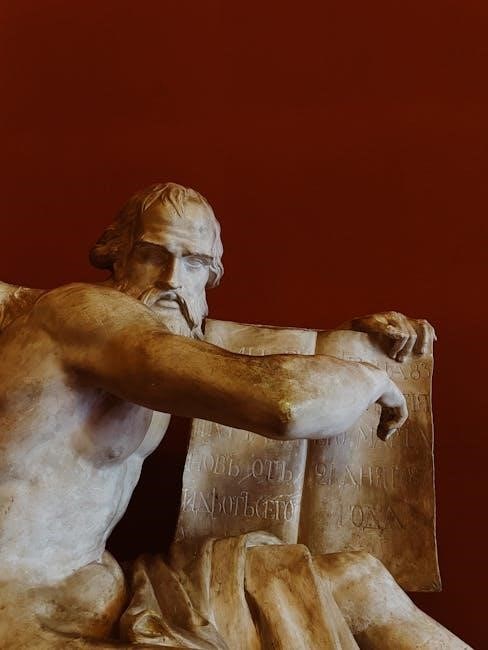The “Readings in Classical Chinese Philosophy” PDF provides essential insights into foundational thinkers like Confucius, Mencius, Laozi, and Han Feizi, offering a comprehensive exploration of core concepts․
Overview of the Importance of Classical Chinese Philosophy
Classical Chinese philosophy profoundly shaped Chinese thought, culture, and ethics, offering timeless wisdom on human nature, morality, and governance․ The “Readings in Classical Chinese Philosophy” PDF provides access to foundational texts, enabling scholars and readers to explore the ideas of Confucius, Mencius, Laozi, and others․ These writings address universal themes like harmony, justice, and self-cultivation, remaining highly relevant today․ The PDF’s expanded selections and historical context provide a deeper understanding of China’s intellectual heritage, making it an invaluable resource for both academic and personal study․ Its insights continue to influence contemporary discussions on ethics, politics, and personal growth, bridging ancient wisdom with modern applications․
Structure and Content of the PDF “Readings in Classical Chinese Philosophy”
The PDF, edited by Philip J․ Ivanhoe and Bryan W․ Van Norden, is structured to provide a comprehensive overview of classical Chinese philosophy․ It includes expanded selections from key figures such as Confucius, Mencius, Laozi, and Han Feizi, offering primary texts that represent the diversity of thought during this period․ The content is organized thematically, covering major schools like Confucianism, Daoism, and Legalism, with introductions and annotations to guide readers․ The second edition enhances accessibility with improved translations and additional historical context, making it a valuable resource for both scholars and newcomers to the subject․ This structure ensures a balanced and insightful exploration of China’s rich philosophical traditions․

Key Philosophers in Classical Chinese Philosophy
Luminaries like Confucius, Mencius, Laozi, Zhuangzi, and Han Feizi shaped classical Chinese thought, their works compiled in the “Readings” PDF, offering timeless wisdom on ethics and governance․
Confucius and His Teachings
Confucius, a central figure in classical Chinese philosophy, emphasized ethical behavior, moral integrity, and proper social relationships․ His teachings, compiled in the Analects, advocate for ren (benevolence), li (propriety), and yi (righteousness)․ He believed in the cultivation of virtue and the importance of education to achieve social harmony․ The “Readings in Classical Chinese Philosophy” PDF highlights Confucius’s principles, such as respecting hierarchy and promoting self-reflection․ His ideas laid the foundation for Confucianism, shaping East Asian thought for centuries․ The PDF also explores how Confucius’s teachings remain relevant today, offering insights into personal and societal improvement through ethical living and responsible leadership․
Mencius: The Development of Confucian Thought
Mencius, a prominent Confucian philosopher, expanded and refined Confucius’s teachings, emphasizing the inherent goodness of human nature․ He argued that individuals are born with “Four Sprouts” of morality, which must be nurtured․ Mencius’s philosophy, as highlighted in the “Readings in Classical Chinese Philosophy” PDF, focuses on ethical cultivation and the importance of societal conditions in shaping behavior․ He introduced concepts like the “well-nurture” metaphor, illustrating how moral instincts can grow if properly cared for․ Mencius also explored political philosophy, advocating for benevolent leadership․ His dialogues, often conducted through debates, provide deep insights into Confucian ethics and remain central to understanding the evolution of Confucian thought, as detailed in the PDF․
Laozi and the Foundations of Daoism
Laozi, the enigmatic founder of Daoism, is traditionally credited with authoring the Daodejing, a cornerstone of Daoist philosophy․ The “Readings in Classical Chinese Philosophy” PDF explores his teachings on the “Dao,” or the ultimate reality, emphasizing harmony with nature and non-action․ Laozi’s philosophy advocates for a life of simplicity, rejecting artificial distinctions and societal constructs․ His concepts of “wu-wei” and the cyclical balance of opposites resonate deeply in Chinese thought․ The PDF highlights how Laozi’s ideas contrast with Confucianism, offering a unique perspective on ethics and governance․ His influence extends beyond philosophy, shaping art, religion, and culture, making him a pivotal figure in Chinese intellectual history․
Zhuangzi: Expanding Daoist Philosophy
Zhuangzi, a key figure in Daoist philosophy, expanded on Laozi’s ideas through his influential text, the Zhuangzi․ This work, composed of parables, anecdotes, and metaphysical discussions, explores themes of freedom, spontaneity, and the relativism of knowledge․ Zhuangzi’s concept of “xiaoyao” (carefree wandering) embodies the ideal of living in harmony with the Dao, unencumbered by societal conventions․ His famous “Butterfly Dream” allegory questions the nature of reality and identity, while “Pipes of Heaven” illustrate the interconnectedness of all things․ Zhuangzi’s philosophy critiques Confucian moralism and emphasizes individual liberation, offering a unique perspective on achieving balance and unity with the natural world․ His ideas remain central to Daoist thought, inspiring both spiritual and intellectual inquiry․
Han Feizi: The Legalist Perspective
Han Feizi, a pivotal figure in Legalist philosophy, emphasized strict governance through law and authority․ His text, Han Feizi, advocates for a centralized state ruled by clear laws and punishments to maintain order․ Rejecting Confucian morality, he argued that human nature is selfish, requiring strong control․ His ideas, such as “fa” (law) and “shu” (techniques of governance), influenced the Qin dynasty’s policies․ Han Feizi’s philosophy contrasts with Daoist and Confucian thought, prioritizing state power over individual freedom or moral cultivation․ His writings remain crucial for understanding Legalism’s role in Chinese history and its enduring impact on political thought․ The “Readings in Classical Chinese Philosophy” PDF highlights his contributions, offering insights into Legalism’s practical applications and its significance in shaping ancient Chinese governance․
The Significance of the “Readings in Classical Chinese Philosophy” PDF
The PDF serves as a comprehensive resource, offering expanded selections from key philosophers like Confucius and Mengzi, while bridging historical and contemporary understanding of Chinese thought․
Historical Context of Classical Chinese Philosophy
Classical Chinese philosophy emerged during the Spring and Autumn (6th–5th centuries BCE) and Warring States (5th–3rd centuries BCE) periods, marked by political instability and intellectual flourishing․ Key figures like Confucius, Mencius, Laozi, and Han Feizi developed foundational ideas aimed at restoring social harmony and order․ The “Readings in Classical Chinese Philosophy” PDF highlights this historical backdrop, tracing the evolution of thought from Confucian ethics to Daoist naturalism and Legalist pragmatism․ The discovery of bamboo manuscripts in 1993 further enriched understanding of these texts, offering insights into their composition and reception․ This historical context is crucial for interpreting the philosophies within their original socio-political framework․
Modern Relevance of Classical Chinese Philosophy
Classical Chinese philosophy remains highly relevant today, offering timeless wisdom on ethics, governance, and personal growth․ The “Readings in Classical Chinese Philosophy” PDF underscores how Confucian values of ren (benevolence) and li (ritual) can inform modern leadership and social ethics․ Daoist concepts like wu-wei (non-action) and harmony with nature resonate with contemporary concerns for sustainability and work-life balance․ Legalist ideas on efficient governance and law also provide insights for modern political systems․ These teachings, spanning centuries, continue to inspire global dialogue on morality, justice, and human flourishing, making them indispensable for understanding both ancient and contemporary philosophical debates․
Comparative Analysis with Western Philosophical Texts
The “Readings in Classical Chinese Philosophy” PDF invites comparisons with Western philosophy, revealing both contrasts and parallels․ While Confucianism’s emphasis on social harmony and ethics mirrors Aristotelian virtue ethics, Daoist notions of natural order align with Stoic ideas of cosmic reason․ Legalism’s focus on law and statecraft draws parallels with Hobbesian political theory․ These comparisons highlight unique perspectives, such as the collective-oriented Confucian self versus the individualistic Western self․ By juxtaposing these traditions, the PDF fosters cross-cultural understanding, enriching philosophical discourse and challenging readers to rethink assumptions about morality, governance, and human nature in both Eastern and Western contexts․
Role of the PDF in Academic and Personal Study
The “Readings in Classical Chinese Philosophy” PDF serves as an invaluable resource for both academic and personal exploration․ It provides accessible translations of key texts, facilitating deeper engagement with Confucian, Daoist, and Legalist ideas․ For scholars, the PDF offers a structured framework for comparative analysis and historical contextualization․ Individuals studying independently benefit from its clear presentation, enabling a self-paced journey through China’s philosophical heritage․ The PDF’s comprehensive approach makes it a versatile tool, supporting curriculum development, research, and personal intellectual growth, while its digital format ensures ease of access and convenience for contemporary learners seeking to understand classical Chinese thought․
Major Schools of Thought in Classical Chinese Philosophy
Confucianism, Daoism, Legalism, and Mohism are the primary schools, each offering distinct perspectives on ethics, governance, and human nature, shaping China’s intellectual and cultural landscape profoundly․
Confucianism: Core Ideas and Evolution
Confucianism, rooted in the teachings of Confucius, emphasizes ethical behavior, moral integrity, and social harmony․ Its core ideas include ren (benevolence), yi (righteousness), and li (etiquette)․ The philosophy evolved through the contributions of Mencius, who focused on human nature’s inherent goodness, and Xunzi, who emphasized the need for social norms and education․ The “Readings in Classical Chinese Philosophy” PDF highlights these developments, showcasing Confucianism’s adaptability and enduring influence in Chinese thought․ This school’s principles have shaped not only personal conduct but also political governance, advocating for leaders to rule with virtue and compassion․ Its evolution reflects the dynamic interplay between individual morality and societal order․
Daoism: Key Concepts and Practices
Daoism, founded by Laozi and expanded by Zhuangzi, centers on the Dao (the Way), a metaphysical force governing the universe․ Key concepts include wu-wei (non-action), ziran (natural spontaneity), and the balance of yin and yang․ The “Readings in Classical Chinese Philosophy” PDF explores these ideas through texts like the Daodejing and Zhuangzi, emphasizing harmony with nature and rejection of artificial constraints․ Daoist practices often involve meditation, simplicity, and aligning oneself with the natural order, fostering inner peace and longevity․ This philosophy offers a holistic approach to life, contrasting with Confucianism’s focus on social structures, and has profoundly influenced Chinese spirituality, art, and daily living․
Legalism: Principles and Historical Impact
Legalism, developed by Han Feizi, emphasizes strict laws, punishments, and a centralized state to maintain order and power․ The “Readings in Classical Chinese Philosophy” PDF highlights Legalist principles, focusing on the ruler’s authority and the elimination of personal discretion in governance․ Legalism was instrumental in the Qin Dynasty’s unification of China, though its harshness led to widespread discontent․ The philosophy advocates for a state governed by clear laws and rewards/punishments, rejecting moral or ethical considerations․ Its historical impact is significant, shaping China’s political structures, though its rigid methods have been criticized․ The PDF provides key texts for understanding Legalism’s role in Chinese thought and its practical applications․
Mohism: Ethical and Social Perspectives
Mohism, founded by Mozi, emphasizes universal love, non-aggression, and the promotion of social welfare․ The “Readings in Classical Chinese Philosophy” PDF explores Mozi’s ethical framework, which advocates for impartial care and the rejection of offensive warfare․ Mohist thought also addresses social inequality, advocating for the elevation of the poor and the wise․ The philosophy is rooted in a utilitarian approach, aiming to maximize overall benefit and minimize harm․ The PDF highlights Mozi’s ten theses, offering insights into his moral and political theories․ Mohism’s focus on practical ethics and social justice provides a unique perspective within classical Chinese philosophy, complementing Confucian and Daoist ideas․ The text serves as a vital resource for understanding Mohism’s contributions to ethical and social thought․

Comparative Analysis of Classical Chinese Philosophy
The “Readings in Classical Chinese Philosophy” PDF explores contrasting ideas among key philosophers, highlighting Confucianism’s social ethics, Daoism’s natural harmony, and Legalism’s authoritarian efficiency, fostering deeper philosophical understanding․
Comparing Confucianism and Daoism
The “Readings in Classical Chinese Philosophy” PDF highlights the contrasting yet complementary nature of Confucianism and Daoism․ Confucianism, led by Confucius and Mencius, emphasizes social harmony, moral ethics, and human relationships, advocating for a structured society governed by rituals and virtues․ In contrast, Daoism, rooted in Laozi and Zhuangzi, focuses on aligning with the natural order (Dao), promoting individual freedom and spontaneity․ While Confucianism seeks to cultivate society through education and moral development, Daoism encourages withdrawal from societal constraints to embrace simplicity and inner balance․ Despite these differences, both philosophies share a common goal of achieving harmony—Confucianism within society and Daoism within nature․ This duality reflects the richness and diversity of classical Chinese thought․
Comparing Legalism with Other Schools
Legalism, represented by Han Feizi, stands out for its pragmatic focus on state control and strict governance, contrasting sharply with Confucianism’s emphasis on moral cultivation and Daoism’s pursuit of natural harmony․ Unlike Confucianism, which prioritizes social relationships and ethical behavior, Legalism advocates for a system of clear laws and punishments to maintain order․ Similarly, while Daoism promotes individual freedom and alignment with nature, Legalism seeks to suppress personal desires for the sake of state stability․ This philosophical divergence highlights Legalism’s unique approach to achieving societal order, often viewed as more rigid compared to the flexible and moral frameworks of other schools․ Its influence on Chinese governance underscores its practical relevance, despite its stark differences from Confucian and Daoist ideals․
Comparative Ethics in Classical Chinese Philosophy
Classical Chinese philosophy offers diverse ethical frameworks, with Confucianism emphasizing ren (benevolence) and li (rituals) to foster social harmony, while Daoism advocates for aligning with nature and embracing wu-wei (non-action)․ Legalism, in contrast, prioritizes strict adherence to laws over moral cultivation․ These systems often intersect, as seen in Confucian and Daoist discussions of personal morality, yet they diverge in their methods to achieve ethical order․ Confucianism focuses on cultivating virtues within individuals, whereas Daoism seeks balance through natural principles․ Legalism, however, dismisses personal ethics in favor of state-enforced norms․ This comparative analysis reveals how each school uniquely addresses ethical concerns, reflecting broader philosophical debates on human nature and societal governance in classical Chinese thought․

Ethical and Political Dimensions of Classical Chinese Philosophy
Exploring the interplay between ethics and governance, classical Chinese philosophy addresses moral cultivation, societal order, and political leadership, offering timeless insights into human conduct and governance․
Ethical Systems in Confucianism and Daoism
Confucianism emphasizes ren (benevolence), yi (righteousness), and li (etiquette), advocating moral cultivation through social relationships and rituals․ Daoism, in contrast, focuses on wu-wei (non-action) and harmony with the Dao, rejecting rigid moral frameworks․ Both systems aim to achieve balance: Confucianism through societal norms and Daoism through natural alignment․ These ethical approaches, explored in texts like the Analects and Daodejing, provide contrasting yet complementary perspectives on morality and human conduct, shaping China’s intellectual heritage․ The PDF highlights these contrasting ethical systems, offering insights into their historical development and enduring relevance․
Political Philosophy in Classical Chinese Thought
Classical Chinese political philosophy explores governance and leadership through the lens of morality and harmony․ Confucianism advocates for virtuous rulers who cultivate ren (benevolence) and maintain social order through li (rituals)․ Mencius further emphasizes the ruler’s duty to ensure the welfare of the people․ Daoism, however, critiques centralized authority, promoting minimal intervention and alignment with the natural order (wu-wei)․ Legalism, represented by Han Feizi, prioritizes strict laws and state power to maintain control and efficiency․ These contrasting perspectives, as explored in texts like the Analects, Daodejing, and Han Feizi, offer diverse approaches to political governance, reflecting the richness of classical Chinese thought․ The PDF provides a comprehensive overview of these ideas and their historical significance․
Social Justice and Morality in Classical Chinese Philosophy
Classical Chinese philosophy deeply explores social justice and morality, emphasizing harmony and ethical behavior․ Confucianism, through concepts like ren (benevolence) and yi (righteousness), advocates for a moral society where individuals fulfill their roles․ Mencius extends this by highlighting the innate goodness of humans and the ruler’s duty to promote the people’s welfare․ Daoism, while less focused on social structures, encourages living in alignment with nature and compassion․ Mohism introduces the idea of impartial care, challenging hierarchical norms․ These teachings, as discussed in the PDF, provide a framework for understanding justice and morality, offering insights into creating a balanced and ethical society rooted in ancient Chinese thought․

Resources and Strategies for Reading Classical Chinese Texts
The Readings in Classical Chinese Philosophy PDF serves as a primary resource, offering expanded selections from Confucius and Mencius for academic and personal study;
Challenges of Interpreting Classical Chinese Texts
Interpreting classical Chinese texts poses significant challenges due to their brevity, ambiguity, and historical context․ The Readings in Classical Chinese Philosophy PDF addresses these by providing expanded selections and comparative analysis․ The aphoristic style of works like the Analects can be disorienting, while the legal and ethical frameworks of thinkers like Han Feizi require deep historical understanding․ Language barriers and cultural nuances further complicate interpretation, especially for non-specialists․ However, the PDF offers a structured approach, making these texts more accessible․ Its inclusion of key philosophers and their ideas helps bridge gaps in understanding, facilitating a richer engagement with classical Chinese philosophy․
Recommended Strategies for Effective Reading
Effective reading of classical Chinese texts requires a structured approach․ The Readings in Classical Chinese Philosophy PDF offers strategies like comparative analysis and contextual understanding․ Readers should engage with key concepts systematically, starting with foundational thinkers like Confucius and Laozi․ The PDF’s inclusion of expanded selections and introductions helps bridge historical and cultural gaps․ Emphasizing ethical and political dimensions, such as Confucianism and Daoism, enhances comprehension․ Leveraging the provided bibliography for further study is also crucial․ By combining these strategies, readers can navigate complex ideas and gain deeper insights into classical Chinese philosophy, making the PDF an invaluable resource for both academic and personal study․
Additional Resources for Deeper Understanding
Beyond the Readings in Classical Chinese Philosophy PDF, supplementary materials like online commentaries and scholarly articles provide further insights․ The second edition by Philip J․ Ivanhoe and Bryan W․ Van Norden includes a selective bibliography, guiding readers to additional texts․ Exploring related works, such as the Analects and Daodejing, enhances understanding․ Online platforms like Google Books and academic databases offer access to these resources․ The PDF’s comparative romanization table and historical context sections are particularly useful․ For advanced study, readers can explore emerging trends in scholarship and contemporary applications of classical ideas, ensuring a well-rounded comprehension of the subject․ These resources make classical Chinese philosophy accessible and engaging for both newcomers and scholars alike․

Bibliography and Further Reading
The Readings in Classical Chinese Philosophy PDF by Philip J․ Ivanhoe and Bryan W․ Van Norden is a primary source․ Additional texts include the Analects, Daodejing, and works by Han Feizi․ Online platforms like Google Books offer access to these materials, while scholarly articles provide deeper insights into historical contexts and modern relevance․ The PDF’s bibliography and comparative romanization table are invaluable for further study․ Supplementary resources, such as commentaries and historical analyses, enhance understanding of classical Chinese thought․
Key Sources for Classical Chinese Philosophy
The Readings in Classical Chinese Philosophy PDF, edited by Philip J․ Ivanhoe and Bryan W․ Van Norden, is a primary source for exploring foundational texts․ It includes selections from Confucius, Mencius, Laozi, Zhuangzi, and Han Feizi, offering insights into Confucianism, Daoism, and Legalism․ Published by Hackett Publishing, the second and third editions provide expanded content and comparative analyses․ Additional key sources include the Analects, Daodejing, and Mengzi․ Supplementary texts, such as commentaries and historical analyses, are also essential for deeper understanding․ These resources are widely available in PDF and EPUB formats, making classical Chinese philosophy accessible for both academic and personal study․
Recommended Texts for Advanced Study
For advanced exploration, the third edition of Readings in Classical Chinese Philosophy offers deeper insights into Confucian, Daoist, and Legalist thought․ The Analects of Confucius, Mengzi, and Han Feizi remain foundational․ Scholars also recommend Zhuangzi: Basic Writings for Daoist philosophy and Mohist Canons for ethical perspectives․ Supplementary texts like Chinese Philosophy: An Overview provide contextual understanding․ Comparative studies, such as Confucianism and Western Philosophy, enhance cross-cultural analysis․ For historical depth, Mozi and Other Early Sources are invaluable․ These texts, available in PDF and digital formats, cater to advanced academic and personal exploration, offering nuanced interpretations of classical Chinese philosophy and its modern relevance․

Future Directions in Classical Chinese Philosophy
Emerging trends include integrating classical ideas into modern philosophy, fostering interdisciplinary research, and exploring global applications of Confucian, Daoist, and Legalist teachings to contemporary challenges․
Emerging Trends in Scholarship
Recent scholarship emphasizes integrating classical Chinese philosophy with modern thought, exploring its relevance to global ethics and political theory․ Researchers are increasingly using digital tools to analyze ancient texts, while cross-cultural comparative studies highlight overlaps with Western philosophy․ The Readings in Classical Chinese Philosophy PDF facilitates this by providing accessible translations of key works, enabling deeper engagement with Confucian, Daoist, and Legalist ideas․ Interdisciplinary approaches, blending philosophy with history and sociology, are gaining traction․ Additionally, there is a growing focus on the practical applications of these teachings in addressing contemporary challenges, showcasing the enduring value of classical Chinese thought in shaping modern discourse․
Integration with Contemporary Philosophy
The “Readings in Classical Chinese Philosophy” PDF bridges ancient and modern thought by engaging with contemporary philosophical issues․ Scholars are increasingly drawing parallels between Confucian ethics and Western moral philosophy, while Daoist concepts of harmony resonate with environmental philosophy․ Legalist ideas are explored in the context of modern political theory․ The PDF’s inclusion of diverse texts facilitates cross-cultural dialogue, enabling philosophers to address global challenges through a lens informed by both Eastern and Western traditions․ This integration not only enriches philosophical discourse but also highlights the timeless relevance of classical Chinese thought in addressing modern ethical, political, and social dilemmas․